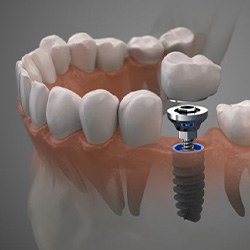Dentures – Williamstown, NJ
Say Goodbye to Gaps
in Your Grin
Whether you are missing one tooth or a whole row of pearly whites, the need for replacement cannot be understated. Having a complete smile not only impacts the way you feel about yourself—and, quite frankly, what others think when they see you—but can also influence both your oral health and physical wellbeing. At iSmile Dental Arts, Dr. Willy Kassem offers three different types of dentures for Williamstown, NJ dental patients: partial, full and implant retained. All are a reliable method of providing you with a smile that is strong, durable, and natural-looking.
The Consequences of Missing Teeth

Just in case the appearance of a missing tooth isn’t enough to convince you to have dentures, here are some other important factors to consider. First, a missing tooth increases your risk of tooth decay and gum disease, two conditions that are often a leading cause of tooth loss initially. Secondly, the adjacency of teeth not only looks attractive, it also helps to maintain a proper bite and alignment. When a tooth is missing, others may start to shift in order to fill the vacant spot. Finally, tooth loss can make eating a nutritious diet more difficult. Many people with missing teeth are forced to eat a soft food diet that does not include healthy raw vegetable and lean meats. For all of these reasons and more, tooth replacement is essential.
Full Dentures

For patients who are missing all of their teeth along one or both arches, Williamstown dentist Dr. Kassem can design a full denture. Thanks to advances in dental prosthetic materials and production, your new dentures will look natural and feel comfortable in your mouth. Of course, you’ll need to be patient, because adjusting to dentures does take a bit of time. But once you’re used to your dentures, you’ll be amazed at how good they look and how securely they stay in place.
Partial Dentures

Partial dentures are ideal if you are missing one or a few teeth. Even if the missing teeth are not consecutive, Dr. Kassem can design a partial denture to fit between your remaining teeth. A partial is made of false teeth, also called pontics, which are attached to a metal framework. The frame is usually hidden and comfortably clips to adjacent natural teeth.
Dental Implant-Retained Dentures

For the ultimate in a secure fit, Dr. Kassem recommends implant dentures. These are held in place by dental implants that are surgically embedded in your jaw by an oral surgeon or periodontist that Dr. Kassem works with regularly. Once you’ve healed and the implants are fully integrated with the bone, Dr. Kassem attaches your denture. Some patients who have been wearing removable dentures for years switch to implant dentures and are remarkably impressed by how securely they fit.
Who Is a Good Candidate for Dentures?

Almost anyone who has lost multiple teeth can be a good candidate for dentures! During your consultation, we will make sure that this treatment is right for you by learning about your oral health and preferences. We will also help you have realistic expectations for your treatment and advise you on which type of denture you should receive. If you are not currently a candidate for the type of denture you desire, you might become one after some preliminary care.
Effects of Missing Teeth

Missing teeth can be the result of various sad circumstances, such as gum disease, a traumatic accident, genetics, and a range of other factors. Regardless of why you are edentulous (missing all your teeth), your condition may cause some challenges in your daily life.
For example, you may lack confidence when you smile. You might even hesitate to engage in social situations. Additionally, you might not be able to eat your favorite foods, and you may even lack key nutrients. Indeed, your entire quality of life may suffer due to your missing teeth. Fortunately, dentures can reduce or eliminate many of the frustrations that come with a toothless smile.
What Qualifies You for Dentures?

Dentures might be a good fit for you if:
- You have lost several or all of your teeth. If you have lost just open or a few teeth, we might recommend a different tooth replacement option.
- Your oral tissues are healthy enough to support dentures. You should be free of active gum disease, and your jawbone should be able to provide a strong base for your prosthetic.
- You are looking for an efficient, cost-effective treatment. Traditional dentures tend to be one of the most affordable options for tooth replacement.
Alternative Tooth Replacement Options

If we determine that dentures are not an ideal option for you, we might suggest that you get one of the following:
- A fixed bridge. A fixed bridge is bonded onto the teeth that surround an empty space in the mouth. It can be a sturdy and long-lasting way to replace one, two, or even three teeth in a row. However, it does require that the supporting teeth undergo some modification.
- Dental implants. Dental implants are prosthetic tooth roots that get surgically placed into the jawbone. They can support crowns, bridges, and dentures. Due to their remarkable strength and longevity, implants are considered the gold standard among tooth replacement options.
How Dentures Are Made

You know dentures are designed just for you, but what does the process look like? Understanding how they’re made and which materials are used will help you to appreciate your smile that much more. Continue reading to learn how we get to the final results.
What Are Dentures Made Of?

Dentures are made of two different parts: the base of the denture and the teeth. Here’s what each component is comprised of:
- Denture Base: This is the foundational structure that gives the artificial teeth support. It can be made from a variety of different materials, including acrylic, nylon, or resin. Full dentures are most often made using acrylic because it can be tailored to closely match your natural gum tissue. Partial dentures may use metal clips with an acrylic base, and, in some cases, nylon is used in place of acrylic.
- Artificial Teeth: The replacement teeth are attached to the denture base. They are often made from resin or porcelain because they both have a natural appearance. However, porcelain is a more popular option because it looks and feels just like natural teeth. It’s also a very durable material.
The Denture Creation Process

Each denture is custom-made for the patient’s mouth, so it requires a multi-step process. First, Dr. Kassem will take impressions of your upper and lower gums using a thick paste. This will be used to create a plaster model that is the exact size and shape of your mouth. This model is used to ensure the final denture is made to perfectly fit your unique smile.
The plaster model is sent to a dental laboratory where your dentures will be made. They will start by creating a wax replica of your gumline. The artificial teeth are then set in place and a mechanical device known as an articulator will be used to attach the teeth with wax. The technician will make minor adjustments.
The wax dentures are sent back to the dental office for a fitting. If they look good, they will be sent back to the dental lab to complete the process. This involves the technician boiling the dentures. This process is completed by placing the dentures in a flask, adding plaster to hold their shape, and then placing the flask in hot water to melt away the wax portions. Holes are made in the teeth and acrylic is injected into the flask to replace the wax.
The plaster is carefully removed from the denture using special tools. Then, the dentures are placed in an ultrasonic bath to remove any remaining plaster. Excess acrylic will also be cut from the denture. Lastly, the restoration will be polished to perfection.
Once the dentures are ready, you will return to the office for a fitting. Adjustments will be made, if needed, to ensure everything is working properly and smoothly.
Adjusting to Your New Dentures

You may feel slight discomfort when you first get new dentures. Fortunately, this is completely temporary. With a little bit of time, your mouth will adjust to dentures, and they’ll feel very similar to natural teeth. During your adjustment period, remember to stick to softer foods and exercise your facial muscles. If the discomfort persists, give us a call so we can help!
Benefits of Dentures

No matter which kind of dentures you receive, they come with a multitude of benefits, including:
- Increasing your self-esteem
- Supporting your facial muscles
- Allowing you to eat a healthy diet of nutritious foods
- Letting you smile with complete confidence again
- Being both functional and comfortable
- Looking like a totally natural part of your smile
Tips for Day-to-Day Denture Use

Here are some tips to make your new life with dentures a little easier:
- Brush your dentures every day to prevent staining and plaque buildup that can cause gum infections.
- Gently brush your gums, tongue, and palate at least once a day. It also helps to rinse with an antimicrobial mouthwash.
- While you sleep, let your dentures soak in cool or lukewarm (never hot) water or denture cleanser. Not only does this give your dentures a chance to get clean, but it lets your gums and jawbone rest after the pressure of holding the dentures in place all day.
- If you’re having trouble eating, try a bit of denture adhesive.
- Start by cutting your food into bite-sized chunks and gradually work up to larger sized bites.
- Avoid dry mouth (which can cause infections) and stay hydrated by regularly sipping water throughout the day.
Are you ready to say goodbye to the gaps in your grin? Then contact us to set up a consultation for dentures. It could change your smile and your life!
Understanding the Cost of Dentures

The cost of dentures will vary from patient to patient, as every case is different. There are all sorts of factors that contribute to the cost. During your initial consultation with us, it will be determined exactly how much you can expect to pay for your new restoration. Until then, here are some things that you should consider.
Factors that Affect the Cost of Dentures

There are three major factors that influence the cost of dentures:
- Any preparation required before you get your dentures will influence your overall treatment cost. This includes needed extractions and gum disease therapy.
- The materials used for the base and replacement teeth will play a role. The base is typically made from acrylic while the replacement teeth can be crafted from either acrylic or porcelain.
- The number of teeth that you are needing to have replaced plays an important factor. The more teeth, generally the higher the cost.
Remember that cheaper doesn’t mean better when it comes to dentures. If you end up opting for budget dentures, they will be more likely to require repairs or replacements sooner than quality ones. You don’t want to end up with a subpar restoration.
Are Implant Dentures More Expensive?

Implant dentures cost more than traditional dentures, but there are good reasons for it. Instead of being supported by the shape and suction of the gums, implant dentures are held in place by a series of dental implants that are placed in the jawbone via a surgical procedure. This allows for many additional benefits, like being more lifelike and having additional stability. Also, you won’t need to have your dentures replaced every 5 to 7 years, as implants are made to last for several decades.
Does Dental Insurance Cover Dentures?

You can expect some level of coverage with most dental insurance plans. Many provide up to 50% coverage, but this will vary depending on your plan. At iSmile Dental Arts, we are proud to be in-network with countless major dental insurance plans. If you have any questions or concerns regarding your dental insurance plan, give us a call.
Other Options for Making Dentures Affordable

If you don’t have dental insurance, that doesn’t mean that you are completely out of luck. We have an in-house dental benefits plan. For an annual fee, you can receive two regular checkups, one emergency visit, and 20% off recommended dental procedures completed at our practice. We also work with CareCredit – a third-party financing company that can split the cost of your treatment into manageable monthly installments with little to no interest. For more information on your financial options, talk to one of our friendly team members!
The best way to learn how much dentures will cost for you is by scheduling a consultation with us. We are eager to help you get your smile back!
Dentures Aftercare

Your dentures are an investment in your oral and overall health, and the care you give them can make the difference between your appliance lasting for more than ten years and breaking a few months after you get it. When wearing dentures, it’s still important to practice excellent oral hygiene and see your dentist regularly for exams and cleanings. During your visits to our office in Williamstown, Dr. Kassem will monitor your oral health and address any issues or abnormalities such as infections or oral cancer. Early detection of oral health issues is often the key to reaching the best outcome. Here’s a quick overview of the best ways to keep your dentures in great shape, but feel free to contact our office with any questions.
Removeable Dentures
Remove After Eating
After each meal, remove your dentures and rinse them off to prevent the accumulation of plaque and food residue that can cause stains, bad odors, or infections. Make sure you don’t use hot water, as the heat can cause the acrylic in the bases of your dentures to warp.
Clean Your Restoration
Dentures require a special daily hygiene regimen. Begin by removing your dentures and gently brushing them with a soft-bristled brush and a small amount of mild dish soap, unscented hand soap, or an approved denture cleanser to remove buildup and lingering dental adhesive. Using normal toothpaste can scratch the appliance, so stick to a gel toothpaste instead. If you aren’t putting your dentures back in immediately, soak them in a container of water or denture-cleansing solution to prevent them from drying out and warping. Since denture-cleansing products are not meant to be ingested, thoroughly rinse your dentures before wearing them again.
Keep Your Dentures Safe
Before starting your daily denture-cleaning ritual, fill the basin of your sink with lukewarm water and place folded towels across your countertop to create a cushion in case you drop them. Always remember to keep your dentures far from the reach of children and pets.
Remove When You Sleep
Wearing dentures restricts the flow of blood to the gums, so wearing them for too long may lead to serious health issues like pneumonia as well as higher levels of plaque on the gums and tongue. To prevent this, remove your dentures before bed and soak them in water or denture-cleansing solution. Allowing your dentures to dry out can cause them to warp.
Notice Changes
Pay attention to the state of your dentures so that you can bring any changes to Dr. Kassem’s attention. Issues to look out for include gum irritation, oral sores, signs of infection, or signs of poor fit such as shifting and clicking. If your dentures are damaged, don’t attempt to repair them on your own as this can cause further damage. If you notice any of these issues, schedule an appointment with us so we can have them cleaned, repaired, relined, or replaced.
All-on-4 Dentures
All-on-4 dentures are secured using four dental implants surgically inserted into the jawbone, making them irremovable. While you can brush them twice daily as you would real teeth, it’s important to stick to non-abrasive toothpaste that doesn’t include baking soda or stain-removing agents. It’s also important to floss at least once a day, and floss threaders or water flossers may make this task easier. To clean between the appliance and the gums, consider using a sulcus brush that is one-third the width of a normal toothbrush. Take care to rinse your mouth with antibacterial mouthwash every day to prevent the development of tartar.
Denture Frequently Asked Questions

Modern dentistry can preserve your teeth for longer than ever; however, many Americans live with significant tooth loss. If you’ve lost several teeth, dentures are a convenient solution to regain a complete, beautiful smile. We know you have a few concerns before you’re ready to commit to them, which we will address during your consultation. While you wait for your visit, here are the answers to a few of the most common questions patients ask us about dentures to help ease any apprehensions.
Am I too young or old for dentures?
Most people get dentures in their 40s or later, but there isn’t an age requirement for treating missing teeth. Many younger people have suffered devastating tooth loss. Dentures are a great option for teeth replacement, even if you aren’t middle-aged. In addition, you’re also never too old to rebuild your smile. Instead, we considered several other factors when determining your candidacy for dentures, like your overall oral health.
Do dentures look natural?
Let’s face it, dentures have a bad reputation for looking fake. While this may have been true in the past, dentures have undergone several improvements over the years. In fact, they are more realistic than ever, so you can chew, speak, and smile confidently because no one will know they aren’t your natural teeth.
Do dentures feel fake?
Besides improving their aesthetics, innovations in dentistry have enhanced the fit and function of dentures. You’ll be able to maintain a balanced diet and enjoy many of your favorite foods; however, they will always have their limitations. If you’d like a stronger bite, ask us how dental implants can support your denture to regain as much as 70% of your natural biting force.
Can I use my dental insurance to pay for dentures?
Every dental insurance plan differs, but most companies offer some coverage for dentures to help offset the amount you need to pay out-of-pocket. We know dental insurance is confusing, but you won’t need to navigate your policy alone. A member of our team will work on your behalf to maximize your benefits to lower your expense. After reaching your deductible, you can use your coverage to pay as much as 50% to 80% of the cost until hitting your annual limit. We’ll take the time to explain how your policy is being used to pay for your smile and discuss your options for any remaining balance, like third-party financing.
How long do dentures last?
Dentures are more durable than ever. They last for an average of 5 to 7 years before needing to be replaced. There are several things you can do to promote their longevity, like cleaning them daily, soaking them at night, and avoid exposing them to heat. In addition, you’ll need to see your dentist regularly to have your dentures maintained, like getting them relined when needed. If you’re interested in a more permanent solution, dental implants have over a 95% success rate, so you’ll never need to worry about having them replaced with the right aftercare.




